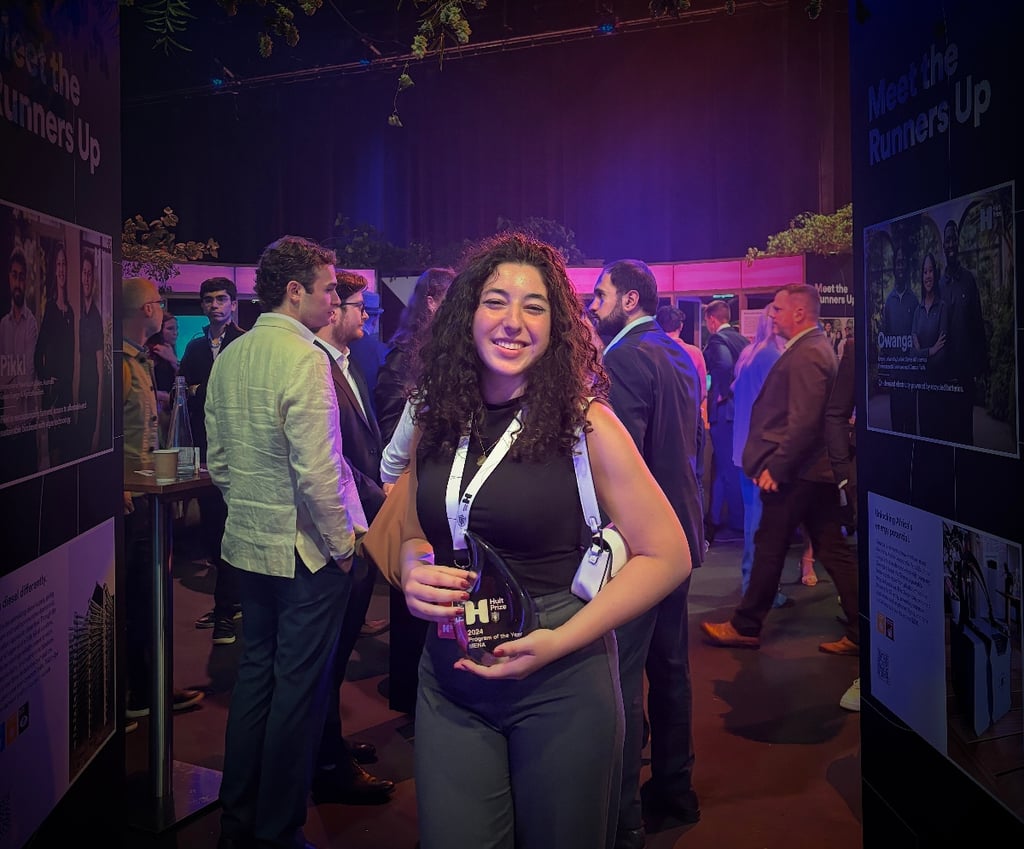
AUI Student Leads University to Hult Prize Victory and Launches EdTech Startup Meet Nada Bennani, a junior at Al Akhawayn University in Ifrane (AUI), who is making waves both in and outside the classroom. While studying Renewable Energy System Engineering, Nada has taken on more than just her coursework—she’s also busy vlogging on her YouTube channel and perfecting her loops on the ice rink. On top of that, she led AUI to win this year’s Hult Prize OnCampus Program of the Year award in the MENA region. Now, Nada is channeling her passion into her own startup, UR-ED, which helps high schoolers gain real world skills. The 20-year-old is constantly coming up with new projects and thanks to the support of AUI’s Employability and Entrepreneurship Office (EEO), she has been able to turn those ideas into a tangible reality.
How did your entrepreneurial journey begin?
My first significant step into entrepreneurship came when I participated in the Hult Prize in 2023. As a member of AUI’s Hult Prize Club, I was part of a team that developed the idea for an app to connect Moroccan tailors with consumers, providing them with a platform to showcase their work. This aligned with that year's competition theme of sustainable fashion. Winning the campus-level competition was a great experience, and we advanced to the semifinals in Rio. Although we didn’t make it to the finals, being among the top six out of sixty startups was an incredible achievement.
What was it like to receive the Hult Prize OnCampus Program of the Year award in London and how did you make it happen?
After my experience as a competitor last year, I wanted to give back to the AUI community. So, I took on the responsibility of leading the Hult Prize program at AUI. My goal was to help other students experience the same opportunities I had. It was a lot of work organizing the program, but it was incredibly rewarding. We had a great group of startups competing, and I was proud to be part of something that encouraged social entrepreneurship at AUI. In September 2024, all our work paid off. I remember seeing our name in the top five and thinking, “No way we’re going to win first place.”
But when they announced our program as the best in the MENA region, I was overwhelmed. The Hult Prize is such a prestigious competition, and to be recognized at that level was beyond anything I had imagined. It wasn’t just about me, though—it was a win for the entire university. The recognition was a testament to the dedication and collaboration of everyone involved in the program.
Meanwhile, you have already started working on your next venture. Can you tell us more about it?
Even though my first startup couldn't take off due to the lack of funding, I wanted to pursue my path in innovation. So, during the Entrepreneurship Week — that has now become the Entrepreneurship Month — organized by the EEO in November, I introduced my new idea for 'UR-ED', an edtech startup focused on providing high school students with practical, project-based learning experiences. Entrepreneurship Week was a turning point. The feedback from mentors helped me solidify my vision for UR-ED. I realized that what I wanted to offer students was not just another online course but a platform where they could develop real-world skills through hands-on projects. The connections I made and the advice I received gave me the confidence to continue developing this idea.
What sets UR-ED apart from other educational platforms?
The key difference is our focus on practical application. There are plenty of platforms offering theoretical courses, but our approach is built around project-based learning that helps students gain valuable skills they wouldn’t typically learn in a standard classroom setting. For example, if a student is learning financial literacy, they won’t just study concepts— they’ll apply them in real-world exercises or develop a project that showcases their understanding. This way, they leave with something tangible they can present to potential employers or universities. We’re also partnering with high schools to make this accessible to students who may not have access to these kinds of learning opportunities.
What challenges have you faced while building UR-ED?
Like any startup, there have been plenty of challenges, from securing funding to developing the right curriculum. Initially, we faced hurdles when it came to financing our projects, which taught us the importance of building something sustainable within our means. We’re still in the MVP stage (i.e., minimum viable product), testing our programs and seeing what resonates with students. It’s been a process of trial and error, but each step forward gets us closer to our vision of empowering students with skills that truly matter.
What advice would you give to Moroccan students who want to pursue entrepreneurship?
My advice is simple: don’t be afraid to try, even if failure seems likely. It’s important to stay adaptable and learn to pivot when things don’t work out. I’ve realized that failure isn’t the end; it’s an opportunity to learn and grow. Surround yourself with mentors who can give you feedback, and take every chance to step outside your comfort zone. Entrepreneurship isn’t just about having an idea; it’s about constantly pushing yourself to make that idea a reality, even when the odds seem against you. Keep trying, keep learning, and don’t give up.
